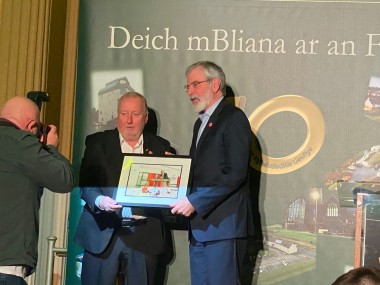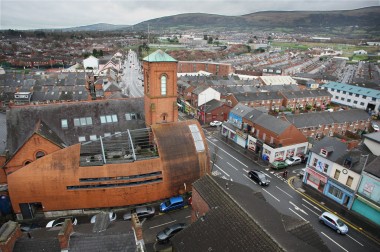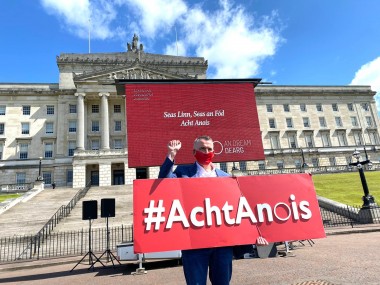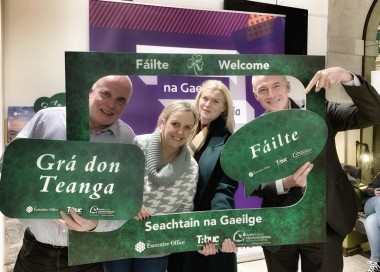An litir dhearg
Bí ar an eolas! Faigh ár nuachtlitir le bheith suas chun dáta leis na feachtais ar fad.

In recent years Seachtain na Gaeilge has become hugely significant as a celebration of the promotion, daily use, and dynamism of the Irish language, or Gaeilge, throughout Ireland and further afield.
Many events are organised over a 14-day period by Irish language activists, the Irish medium education sector, other cultural organisations such as the Gaelic Athletic Association, and local neighbourhoods where Gaeilge is used as part of daily life, or where its use is actively supported. All of these climax around St Patrick’s Day on the 17 March, when I am penning this article.
Last week Ciste Infhéistíochta na Gaeilge (the Irish language investment fund) held its awards dinner and recognised many of the projects and schemes it has helped to secure important investment for since its foundation.
This annual event was paused since 2020 due to the pandemic. I had been due to attend as an Executive Minister and guest speaker back then, and so was delighted to get an invitation to participate on this occasion on behalf of The Executive Office.
Over the years The Executive Office has partnered with An Ciste in delivering a number of very successful projects through the Social Investment Fund.
To date, five strategic capital projects have been jointly delivered with an investment of over £4.7 million by The Executive Office, and additional funding of £1.3 million from An Ciste.
These include Glór Léim an Mhadaidh (in Limavady), Glór Dhún Geimhin (in Dungiven), Croí Éanna (Hightown, in Glengormley), Ionad na Fuiseoige (Twinbrook, in Belfast) and Iontaobhas na Gaelscolaíochta (at Áras na bhFál, in Belfast); all of which have worked closely with The Executive Office and An Ciste to provide vital services including Irish Language provision within their local communities.
I have watched the development of all these projects over the years – not least Croí Éanna, with which I have a very personal attachment.
This partnership model has been an excellent example of what can be achieved when the power-sharing Executive in the north and the community and voluntary sectors work together.
Ciste Infheistíochta na Gaeilge was aptly named as an investment fund.
Since its inception it has addressed key priorities which have enabled Pobal na Gaeilge to create substantial infrastructure to build the resilience and sustainability of the Irish cultural identity.
As a result Ciste Infheistíochta na Gaeilge has demonstrated in a practical sense the hugely positive and transformational role which Gaeilge plays within the wider community in the north of Ireland.
So this Ciste event was also about marking the achievement of a significant milestone and many ground breaking achievements over the past 12 years.
I remember very well that wintry weekend back in January 2010 during the Hillsborough Castle negotiations, when agreement was achieved to establish Ciste.
The Sinn Féin negotiation team stayed late on the final Saturday night. Gerry Adams was determined this particular phase of negotiations would not conclude without securing important gains for the Irish language. Four years previously the British government had committed to delivering on an Irish Language Act, or Acht Gaeilge, under the terms of the St Andrew’s Agreement. And in the interim, nothing was done to honour that obligation.
Agreement to establish Ciste Infheistíochta na Gaeilge with the initial financial resource to create an investment fund was the result of the Sinn Féin leadership’s relentless determination.
Both Gerry and Ted Howell were central to that strategic negotiation achievement and were in attendance at this awards dinner. It was appropriate their role was acknowledged, and also fitting that a tribute was presented to Gerry during the evening.

Over 160 were in attendance from all over Ulster. The large cross section of younger Irish language activists in the room was particularly noticeable.
For decades language activists in the north of Ireland ensured that Gaeilge continued to thrive in the face of systemic state discrimination and hostility, and the absence of any public resources or investment.
Those who spoke, promoted and taught the language, or Gaelic games and cultural life were deemed as enemies of the northern state.
Against that political backdrop what has been accomplished in the last 50 years is truly remarkable.
Many of us who grew up in the intervening period were inspired by what has now become a mantra for northern Gaels, in particular, “Na habair é, deán é” - (‘don’t just say it, do it’).
We proudly took our lead from great Gaeilgeoirí like Séamas Mac Seáin, Albert Fry and others, who urged that it wasn’t enough to talk about what we wanted, we had to get on and do it!
And that is exactly what we did. We made it happen.
So we taught more community-based Irish classes; built schools; reared our children to speak Gaeilge; mainstreamed bilingualism; ensured that our games, music, and dance all flourished; and, with immense pride and dignity, we put our national and cultural identity at the heart of the places where we lived.
Ciste Infheistíochta na Gaeilge is one of the products of all that endeavour.
I recall back in the 1980s when the Irish language daily newspaper ‘Lá’ emerged and the young pioneers of that era such as Gearóid, Eoghan, Áine, Máirtín, Seán, among others began a debate about the need for ‘institutions’ to underpin the language revival which was growing in momentum across the north.
They were absolutely right. Institiúidí Gaeilge were necessary.
Since then the Irish language revival in the north, and indeed throughout Ireland, has become a ‘revolution’.
We now have a complete infrastructure, which continues to expand, underpinning urban Gaeltacht quarters, and breac Gaeltachtaí; thousands of children being taught through the medium of Irish every week; and, two thriving meán scoileanna, (or secondary level colleges), in Belfast and Dungiven, in County Derry.

Gaeltacht Quarter, Belfast Photo: Thomas, North Belfast News
Through its existence Ciste proves what is achievable when the resources are made available.
Importantly it has established that the language and our rich cultural heritage belongs to all traditions in our society and is inclusive and welcoming to everyone regardless of politics or creed.
That is why 15 years after Acht Gaeilge, the Irish Language Act, was promised under the St Andrew’s Agreement, it is an absolute indictment of British state policy, and the sectarianism of sections of political unionism that appropriate legislation and official recognition for the Irish language in the north of Ireland continues to be denied.
The failure to confer legislative equality upon pobal na Gaeilge, Irish language speakers, and the Irish national identity in the north of Ireland remains a massive fault line at the core of the political process.
It was in recognition of the imperative to finally resolve this denial of rights that the obligation to legislate for an Irish Language Act; including official recognition of the language and appointment of a Language Commissioner (consistent with best practice and provision in Scotland, Wales and south of Ireland), was a cornerstone obligation enshrined within the ‘New Decade, New Approach’ deal, which restored the power-sharing institutions in January 2020.
During last summer 2021, as the leadership of the DUP changed hands, those in charge explicitly told the Sinn Féin leadership their party would continue to block Acht Gaeilge being passed through the northern Assembly.
We immediately asked the British government to move the legislation through Westminster to avoid more delay, just as we have had to do to secure marriage equality and women’s reproductive health rights.

The Tory government agreed and promised to deliver on this commitment with accelerated passage by October 2021. That date passed without delivery.
Then both British ministers and senior officials promised that the process would be completed before the northern Assembly dissolved by the end of this mandate on 28 March.
In fact, during November and December 2021, I and party colleagues were given technical briefings, and later sight of the actual draft legislation.
Throughout January and February these same politicians and officials repeated that this obligation would be honoured with a date before the end of March.
The 28 March is now days away. No date has been provided. No explanation has been forthcoming.
In a significant intervention during the Westminster debate on the Irish diaspora in Britain, on St Patrick’s Day, Scottish National Party (SNP) MP, Martin Docherty-Hughes highlighted this continued lack of progress, and challenged the Tory minister in attendance when the British government would notify a date to progress passage of the Irish language legislation. The Minister responding did not do so.
It is clear the British government has acted with premeditated duplicity.
Fifteen years after St Andrew’s; over two years after NDNA; and now nine months after the promise to deliver accelerated passage in Westminster the clock has been run down. The British have lied again.
It is an obvious question to pose whether the British have ever been serious about implementing Irish language rights, and whether legislative recognition of the Irish language, and by extension the Irish national and cultural identity in the north of Ireland, is even within the political calculus or capacity of the Tories and the British state.
If Acht na Gaeilge remains undelivered, this will amount to a new, serious act of deceit, and another broken agreement by a British government. But at its heart is a fundamental underestimation of the determination of northern Gaels, and the momentum of the Irish language and cultural revolution across the island of Ireland.

Make no mistake, the demand for Irish language rights, legislation and official recognition will not go away. It will grow stronger, and it will continue to overshadow politics in the north of Ireland until the Irish government stands up decisively for the rights of Irish citizens in this region, and the British government meets its obligations under both internationally binding agreements and international law.
Bí ar an eolas! Faigh ár nuachtlitir le bheith suas chun dáta leis na feachtais ar fad.